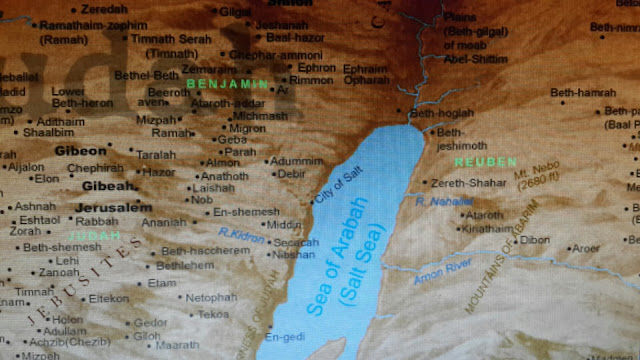On a map of ancient Israel (then called Caanan), the existence of a Biblical town by the name Beth-Jeshimoth, which appears as Beth-Jeshibeth in other sources raises the question of the nature of the links between the Indian and Caananitecivilizations.
The name Jeshimoth is translated as 'Place of deserts'. It is described in the Old Testament as the last camping site of the Israelites before they crossed the river Jordon near the North East end of the Dead Sea also referred to as the Salt Sea. The camp-site extended up to a place called Abel-****tim.
The name Jeshimoth is translated as 'Place of deserts'. It is described in the Old Testament as the last camping site of the Israelites before they crossed the river Jordon near the North East end of the Dead Sea also referred to as the Salt Sea. The camp-site extended up to a place called Abel-****tim.
The word Beth means 'house' or 'dwelling' in Hebrew. But there is much debate on meanings of the names of sacred towns such as Bethlehem. Known as Bayt Lahm in Arabic the name literally means 'House of Meat'. In Hebrew the town is known as Bet Lehem which means 'House of Bread'.
Bethlehem is a sacred site.The Hebrew Bible identifies Bethlehem as the city of David. The New Testament identifies Bethlehem as the birthplace of Jesus. Therefore, 'House of Bread' or 'House of Meat' does not do the name Bethlehem much justice.
A historical reference to Bethlehem appears in the Amarna Letters (c.1400 BC) where Bethlehem is known as Bit-Lahmi . The proximity of the name Bethlehem to Bit-Lahmi indicates that this was a settlement of the Canaanites, a pre-Jewish people who lived in Israel.
In his book 'The uttermost part of the Earth: a Guide to places in the Bible', Richard R Losch traces the name Bit Lahmi of the Amarna Letters to Lachmo, the Akkadian god of fertility. The Akkadian (Mesopotamian region) civilization flourished around 3000 BC. Lachomo, the Akkadian God was worshiped by the Canaanites as Lachma. They also worshipped Goddess Lachama as his wife.
The 'Sea of Galilee' is also known as Kinneret or Lake Gennesaret. In Sanskrit, 'sara' (सर) means 'lake', 'sarat' (सरत्) means 'flowing', and 'sarita' (सरित्) means 'river'. The word 'ghanasara' (घनसार)means 'water' - the 'ghana' here indicating 'deep' or 'immense' amount of water.
1. Who was Abraham?
2. The Phoenicians - Global Navigators
3. Encyclopedia of Ancient Dieties
4. Jewish Encyclopedia
5. The Cottage Bible - Volume 2 edited by Thomas Williams
6. A Study in Oriental History by Fredrick Carl Eiselen
Bethlehem is a sacred site.The Hebrew Bible identifies Bethlehem as the city of David. The New Testament identifies Bethlehem as the birthplace of Jesus. Therefore, 'House of Bread' or 'House of Meat' does not do the name Bethlehem much justice.
A historical reference to Bethlehem appears in the Amarna Letters (c.1400 BC) where Bethlehem is known as Bit-Lahmi . The proximity of the name Bethlehem to Bit-Lahmi indicates that this was a settlement of the Canaanites, a pre-Jewish people who lived in Israel.
In his book 'The uttermost part of the Earth: a Guide to places in the Bible', Richard R Losch traces the name Bit Lahmi of the Amarna Letters to Lachmo, the Akkadian god of fertility. The Akkadian (Mesopotamian region) civilization flourished around 3000 BC. Lachomo, the Akkadian God was worshiped by the Canaanites as Lachma. They also worshipped Goddess Lachama as his wife.
About 1000 years before the Hebrews arrived in Israel, the Cannanites erected a temple to worship the god on the hill now known as the Hill of the Nativity in the town of Beit Lachama. Beit Lachama was fertile and had a good water supply. When the Jews came in they would naturally not worship the Caanan god Lachma and the distortion of interpretations began.
William F. Albright, an American archaeologist and Biblical Scholar states in his research that, to the Cannaites Beit Lachma meant 'Temple of the God Lakhmu', which later distorted to 'House of Bread' in Hebrew & Aramaic and to 'House of Meat' in Arabic. The etymology of Lakhmu and why the God had that name is unknown. His female counterpart was known as Lachama.
There are two Vedic Gods or figures that have names close to Cannanite God Lachmu and Goddess Lachama. In the Indian scriptures two well known names are - 1. the Goddess Laksmi(लक्ष्मी) - the goddess of wealth and prosperity, and 2. the brother of Sri Rama whose name was Lakshmana (लक्ष्मण). 'Lakshmi' (लक्ष्मी) in Sanskrit means 'wealth', 'fortune' or a 'mark'. 'Lakshman' (लक्ष्मण) means 'lucky' or 'fortunate'.
If the Canaanite name Beit Lachma is linked in anyway to Lakshmana or Lakshmi, then it is possible that the word Jeshibeth may be somehow be related to Joshimath. As the Hebrew 'beth', so the Sanskrit 'math' )(मठ्). Both mean dwelling. In fact the Sanskrit 'math' stands for a 'sacred dwelling'.
This may sound unconvincing at first, but the ancient map of Israel also has the following Sanskritic names on it: Rivers Kishon and Narabata, the towns of Ramah and Ramathiam and Kanah, the town of Jamnia on a river and the Jamnia Harbour and so on..
Caanan is referred to in the Amarna Letters as 'Kinahhu', while other sources of the Egyptian New Kingdom mention numerous military campaigns conducted in a place called 'Ka-na-na' - all these ancient names are cognates to the name 'Kanha' (कान्हा) - the name of Sri Krishna who was also known as 'Kanan' (कानन) and 'Kishen' (किशन). The existence of a river Jamnia in Caanan, the name a close cognate of Yamuna or the Jamuna therefore is no surprise.
One of the largest rivers in Israel, is known as the Kishon (also called Kishen).The Kishon flows in the region known as Phoenicia. In the same province are located the towns of 'Ramah' and 'Kanah'. Then there is the town of 'Ramathiam' in the province of Judea - and yet another town by the name of 'Ramah' in Judea which is different from the one located in Phoenicia. See map at the bottom.
Edward Po****e, in his book 'India in Greece' states that the Cannanites were the people of Kanha, or Krishna, the Vedic God,who after the devastation of the Mahabharata war moved westwards from India. There is much authenticity in this argument and the Jewish Encyclopedia attests to this fact.
There are two Vedic Gods or figures that have names close to Cannanite God Lachmu and Goddess Lachama. In the Indian scriptures two well known names are - 1. the Goddess Laksmi(लक्ष्मी) - the goddess of wealth and prosperity, and 2. the brother of Sri Rama whose name was Lakshmana (लक्ष्मण). 'Lakshmi' (लक्ष्मी) in Sanskrit means 'wealth', 'fortune' or a 'mark'. 'Lakshman' (लक्ष्मण) means 'lucky' or 'fortunate'.
If the Canaanite name Beit Lachma is linked in anyway to Lakshmana or Lakshmi, then it is possible that the word Jeshibeth may be somehow be related to Joshimath. As the Hebrew 'beth', so the Sanskrit 'math' )(मठ्). Both mean dwelling. In fact the Sanskrit 'math' stands for a 'sacred dwelling'.
This may sound unconvincing at first, but the ancient map of Israel also has the following Sanskritic names on it: Rivers Kishon and Narabata, the towns of Ramah and Ramathiam and Kanah, the town of Jamnia on a river and the Jamnia Harbour and so on..
Caanan is referred to in the Amarna Letters as 'Kinahhu', while other sources of the Egyptian New Kingdom mention numerous military campaigns conducted in a place called 'Ka-na-na' - all these ancient names are cognates to the name 'Kanha' (कान्हा) - the name of Sri Krishna who was also known as 'Kanan' (कानन) and 'Kishen' (किशन). The existence of a river Jamnia in Caanan, the name a close cognate of Yamuna or the Jamuna therefore is no surprise.
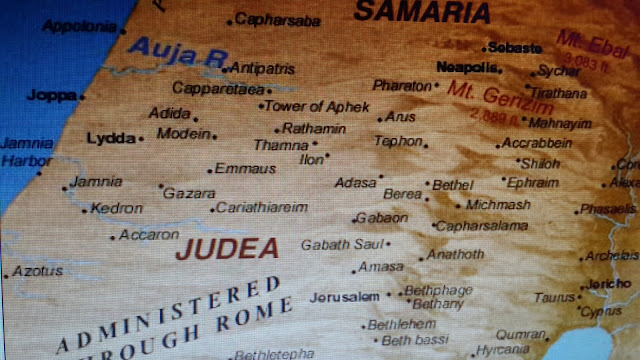 |
| On the map of Caananite Israel, is the river Jamnia, a Jamnia town and a Jamnia Harbour. |
 |
| On the map of Israel are the towns of Narbata on River Narbata, the towns of Tirathana, Rathamin and Mahanayim. There is a Gitta too. |
Edward Po****e, in his book 'India in Greece' states that the Cannanites were the people of Kanha, or Krishna, the Vedic God,who after the devastation of the Mahabharata war moved westwards from India. There is much authenticity in this argument and the Jewish Encyclopedia attests to this fact.
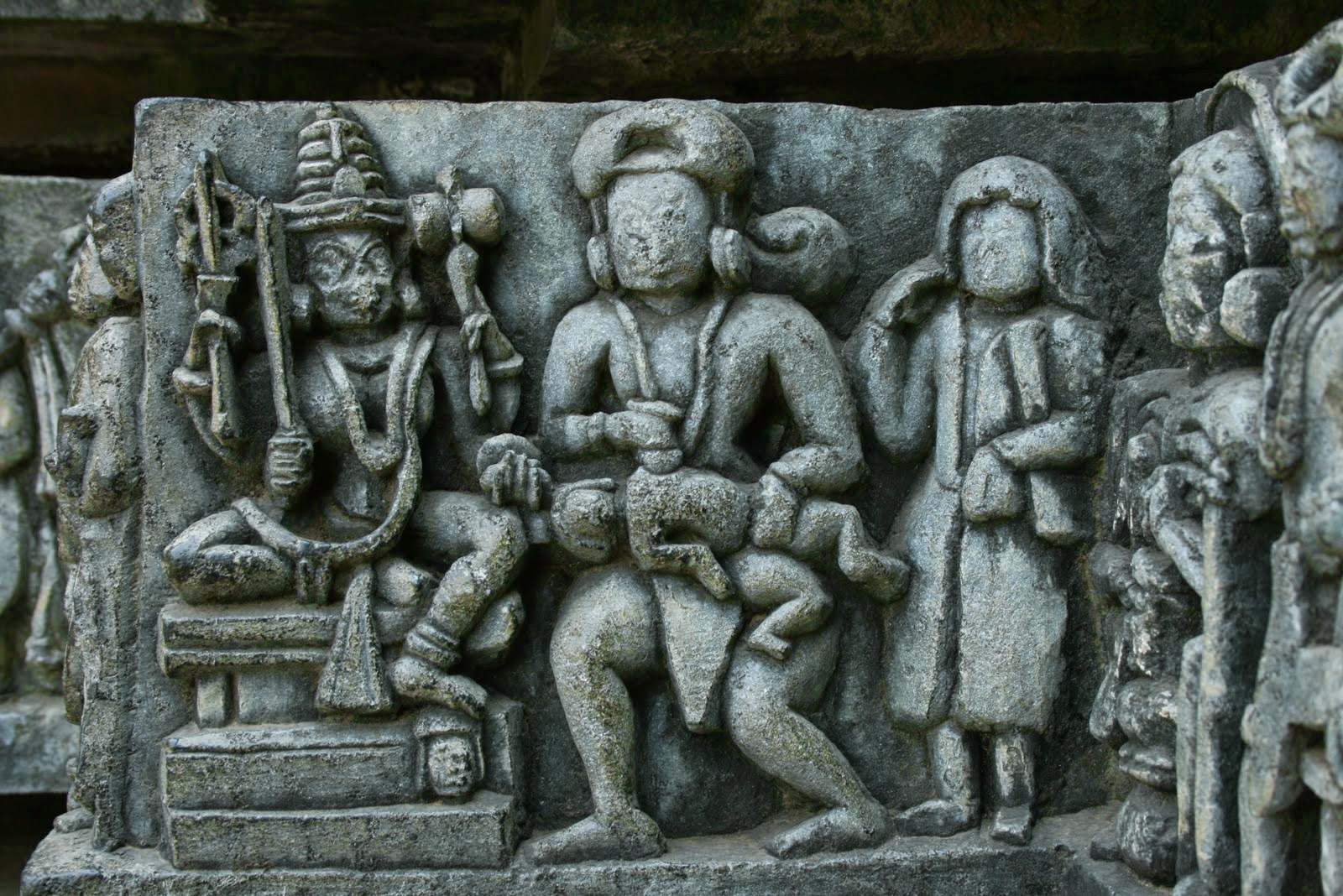 |
| The posture of a Cannnite (pre Jewish Israel) God seated on the left shows a close link to Indian sculpture. |
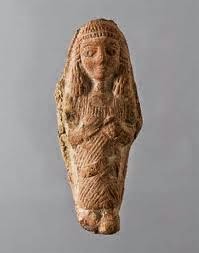.jpg) |
| Cannanite Goddess of Fertility - There is much confusion about the names (God) Lachma and its female form (Goddess) Lachama. |
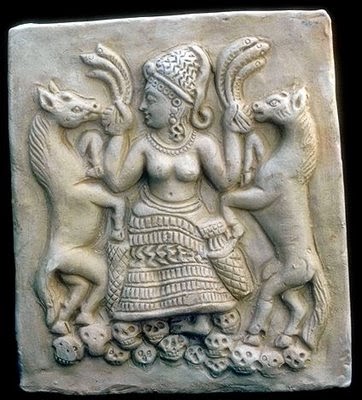 |
| The Cannanite Goddess Astrate depicted here with snakes in her hands and skulls under her feet, much like the Vedic Goddess Kali. |
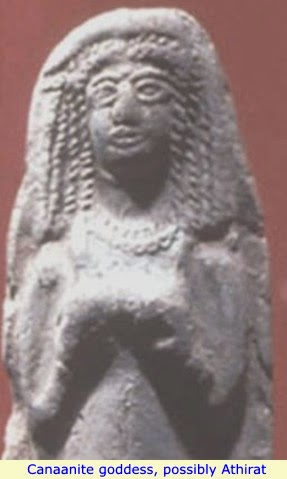 |
| Here is a Canaanite Goddess wearing a 'tilak' on her forehead. |
The Jewish Encyclopedia, referring to the writing of Clearchus of Soli, who was the disciple of Aristotle and wrote extensively around 320 BCE on eastern cultures, states that Aristotle was of the view that the Hebrews were descendants of the Indian philosophers.
Titus Flavius Josephus was a first-century Romano-Jewish scholar, historian and hagiographer, who was born in Jerusalem. In his works, Josephus quotes the writings of Clearchus of Soli. He relates the story of a dialogue between Aristole and a Jewish scholar. He quotes Clearchus thus, "In his first book on Sleep he relates of Aristotle, his master, that he had a discourse with a Jew; and his own account was that what this Jew said merited admiration...... To speak of the race first, the man was a Jew by birth and came from Cœlesyria [Palestine]. These Jews are derived from the philosophers of India. In India the philosophers call themselves Kalani, and in Syria Jews, taking their name from the country they inhabit ... the name of their capital is rather difficult to pronounce: they call it Jerusalem". For more on this click here.
Godfrey Higgins states in his book 'Anacalpysis', "Megasthenes, who was sent to India by Seleucus Nicator, about 300 years before Christ, and whose accounts are every day acquiring additional credit, says that the Jews 'were an Indian tribe called Kalani...".
Suggested Readings:Titus Flavius Josephus was a first-century Romano-Jewish scholar, historian and hagiographer, who was born in Jerusalem. In his works, Josephus quotes the writings of Clearchus of Soli. He relates the story of a dialogue between Aristole and a Jewish scholar. He quotes Clearchus thus, "In his first book on Sleep he relates of Aristotle, his master, that he had a discourse with a Jew; and his own account was that what this Jew said merited admiration...... To speak of the race first, the man was a Jew by birth and came from Cœlesyria [Palestine]. These Jews are derived from the philosophers of India. In India the philosophers call themselves Kalani, and in Syria Jews, taking their name from the country they inhabit ... the name of their capital is rather difficult to pronounce: they call it Jerusalem". For more on this click here.
Godfrey Higgins states in his book 'Anacalpysis', "Megasthenes, who was sent to India by Seleucus Nicator, about 300 years before Christ, and whose accounts are every day acquiring additional credit, says that the Jews 'were an Indian tribe called Kalani...".
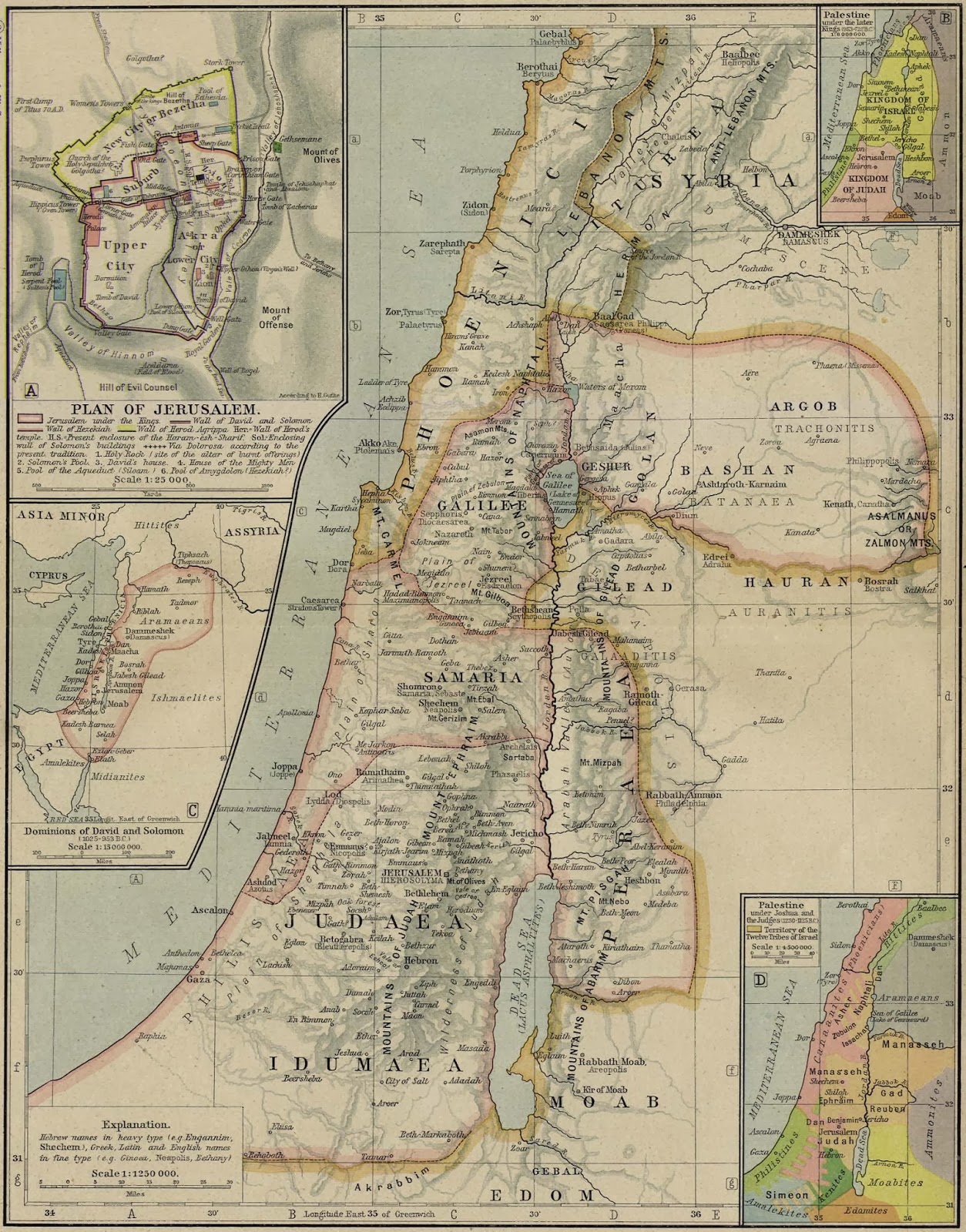 |
| Look for the River Kishon just north of Mt. Carmel and many towns named Ramah. |
1. Who was Abraham?
2. The Phoenicians - Global Navigators
3. Encyclopedia of Ancient Dieties
4. Jewish Encyclopedia
5. The Cottage Bible - Volume 2 edited by Thomas Williams
6. A Study in Oriental History by Fredrick Carl Eiselen

